|

(Red Hen Press, 1999, 72pp. ISBN: 1-888996-09-9
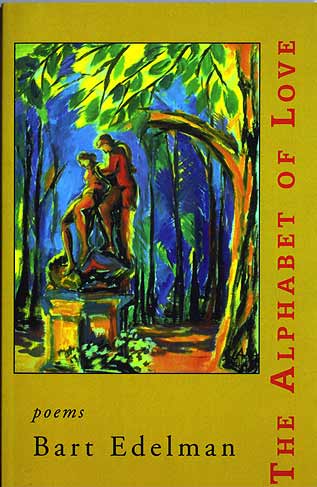 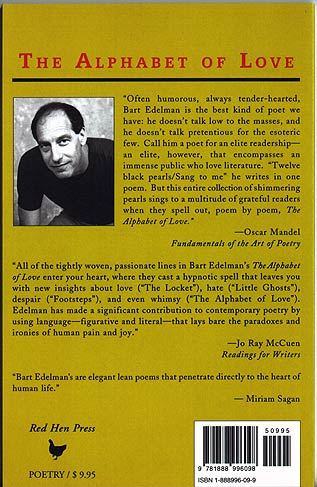
The Alphabet of Love
Black Pearls
Bones of Silence
The Book of Life
The Crow’s Nest
The Dancer
Day of the Locus
Denial
The Dogs of Amadeus
East Meets West
Flight
Footsteps
The Great Dark
The Howl
Imminent Danger
Invitation
Lake Success
The Late Natalie Wood
Little Ghosts
The Locket
The Loft
Mark Twain’s Cigar
Modern Man
Names
The New Train
The Old Lie
Piano Lesson
The Policeman’s Wife
The Reading
Refuge
The Road to Jerusalem
Salmon
Shadow
Sisters
Skylight
Stories
Swine
Ten Years from Now
The Terminal of Grief
The Thin Wire
The Visit
Watch
White Bird
The Word
SAMPLE POEMS
The Book of Life
The Crow's Next
The Great Dark
Most of the poems contained in The Alphabet of Love were written between 1997 and 1999. The idea of listing the poems by alphabetical title was a rather late choice but seemed to work as well as any order I could decide for the book. Perhaps, I shouldn’t be admitting to this; however, I was thrilled with what randomly transpired, due to the mystery surrounding how the poems ought to be placed—very often a knotty problem for a poetry collection and one that usually drops into the lap of a cautious editor.
That the opening poem, coincidentally, was “The Alphabet of Love” sealed the deal. This selection and its somewhat haphazard direction of how so many of us interact romantically—on the surface—is a gentle reminder that be it fate, chance, or will, we appear destined to carry out our mission to couple and partner, no matter what the cause or effect. If we truly desire companionship, at all cost, there is probably someone out there seeking the same measure—for better or worse. Whether it is simply ourselves, or the likes of Nathanael West (“Day of the Locus”), Amadeus Mozart (“The Dogs of Amadeus”), Mark Twain (“Mark Twain’s Cigar”), Natalie Wood (“The Late Natalie Wood”), or the poor children who haunt the camps at Terezin and Auschwitz (“ Little Ghosts”), we are all in need of the dose of kindness that love’s dispensary provides if we are fortunate enough to find it, hidden or not, among us.
Whether or not a higher power is at work to guide us and grant us “The Word,” or we are determined to discover a path towards salvation through the generous acts of others—or ourselves—we follow an unconscious path, at times, and seek refuge, where possible, in places and locations we might have never imagined to investigate and bear witness. It may be upon “The Road to Jerusalem,” aboard “The New Train,” or in “The Terminal of Grief,” yet we still search for solace and speak the only common language we understand, this pursuit of love we may even try to escape—but never deny.

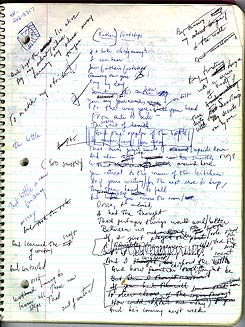 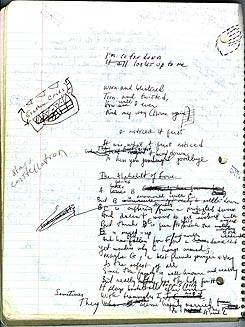 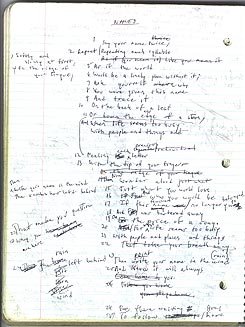

"Often humorous, always tender-hearted, Bart Edelman is the best kind of poet we have: he doesn’t talk low to the masses, and he doesn’t talk pretentious for the esoteric few. Call him a poet for an elite readership—an elite, however, that encompasses an immense public who love literature. “Twelve black pearls/Sang to me” he writes in one poem. But the entire collection of shimmering pearls sings to a multitude of grateful readers when they spell out, poem by poem, The Alphabet of Love."
—Oscar Mandel, Fundamentals of the Art of Poetry
"All of the tightly woven, passionate lines in Bart Edelman’s The Alphabet of Love enter your heart, where they cast a hypnotic spell that leaves you with new insights about love (“The Locket”), hate (“The Little Ghosts”), despair (“Footsteps”), and even whimsy (“The Alphabet of Love”). Edelman has made a significant contribution to contemporary poetry by using language—figurative and literal—that lays bare the paradoxes and ironies of human pain and joy."
—Jo Ray McCuen, Readings for Writers
"Bart Edelman’s elegant, lean poems penetrate directly to the heart of human life."
—Miriam Sagan
|

